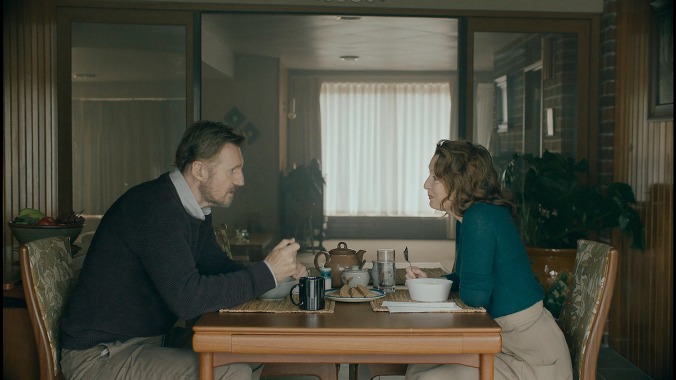Liam Neeson and Lesley Manville can’t cure what ails Ordinary Love

Can good performances save mediocre material? Conventional wisdom says that sheer charisma can help compensate for a film’s otherwise lackluster elements. After all, movie stars partially exist to be gazed at, which will inevitably distract from, say, a pedestrian screenplay or middling direction. But it’s too great a burden to put on any actor, expecting them to salvage a whole project on their lonesome. Case in point: Despite their best efforts, Liam Neeson and Lesley Manville can’t rescue Ordinary Love, a bland drama about a late-middle-aged couple grappling with a cancer diagnosis.
The blandness can be attributed to Owen McCafferty’s stick-to-the-facts script. The film diligently follows every step of a breast cancer diagnosis, from when Joan (Manville) casually discovers a lump in her breast to her initial biopsy and, eventually, to her chemotherapy and multiple operations. There isn’t a moment in Ordinary Love that feels unrealistic or outside of someone’s lived experience. Each of Joan’s hospital visits are appropriately impersonal and sterile, broken up by brief moments of connection between her and other cancer patients undergoing the same treatment. Her harrowing post-chemo nausea and pain will likely be familiar to anyone who has either gone through or witnessed such trauma. Ditto the nerve-wracking moments spent waiting in doctors’ offices or idling in cars on the way to treatment, desperately trying to stave off anxiety. McCafferty’s goal is to take a viewer through every stage of an ordeal that affects millions of people worldwide, and he broadly succeeds.
Unfortunately, it’s that same commitment to realism that makes Ordinary Love such a dull viewing experience. The film moves from one moment to the next propelled only by a simulacrum of life’s mundane routine instead of dramatic tension. It feels abstractly insensitive to suggest that a depiction of cancer treatment should be more exciting, but Ordinary Love demonstrates that simply hewing to the real-life details isn’t enough to generate drama. McCafferty’s playwrighting background leans heavily on dialogue, which inevitably means that complex internal emotions are bluntly communicated through simple speech, e.g. Joan screaming, “We are not going through this together!” at her husband, Tom (Neeson), underscoring the obvious. Worse, directors Lisa Barros D’Sa and Glenn Leyburn bring little visual acumen to Ordinary Love, relying too heavily on centered compositions and repetitive pillow shots to break up stagey scenes of shared vulnerability.
All of these formal shortcomings can’t be absorbed by Neeson and Manville, whose lived-in chemistry remains the only notable element of Ordinary Love. Their characters’ comfortable domesticity and longterm romance provides the film with a gentle, sympathetic foundation. They persuasively capture the behavior of two people who’ve been together for decades—good-humored teasing, constant bickering, the intimations of a tragedy they’ve previously endured. It’s difficult not to be moved while watching Tom sweetly complement Joan after he shaves her head (“I never liked your hair anyway,” he says) or Joan asking Tom if he’ll miss her breasts once she undergoes a double mastectomy. Neeson and Manville expertly convey their characters’ public and private fears, which lends Ordinary Love some real emotional weight. It’s just a shame that extraordinary talents can’t redeem an ordinary film.